Reflection on Fieldwork Placement: Community Service Journal
VerifiedAdded on 2022/08/20
|11
|2884
|27
Journal and Reflective Writing
AI Summary
This document is a student's reflective journal on their fieldwork placement at Mosman Park Nursing Home in Perth. The journal entries detail the application of classroom learning in a real-world setting, focusing on client interactions, communication skills, and problem-solving. The student reflects on specific tasks performed, such as assisting with daily activities, managing conflicts, and facilitating reminiscence activities. The reflections also cover the challenges of cross-cultural communication, the importance of empathy and patience, and the support received from supervisors and other agency staff. Furthermore, the journal explores the personal and professional challenges and joys of being a community services worker, highlighting the importance of client-centered care, cultural competency, and the development of essential skills. The student also discusses their learning style, management preferences, and the skills they have acquired through this placement. The student gained valuable experiences and insights that will help them in their future workplace.
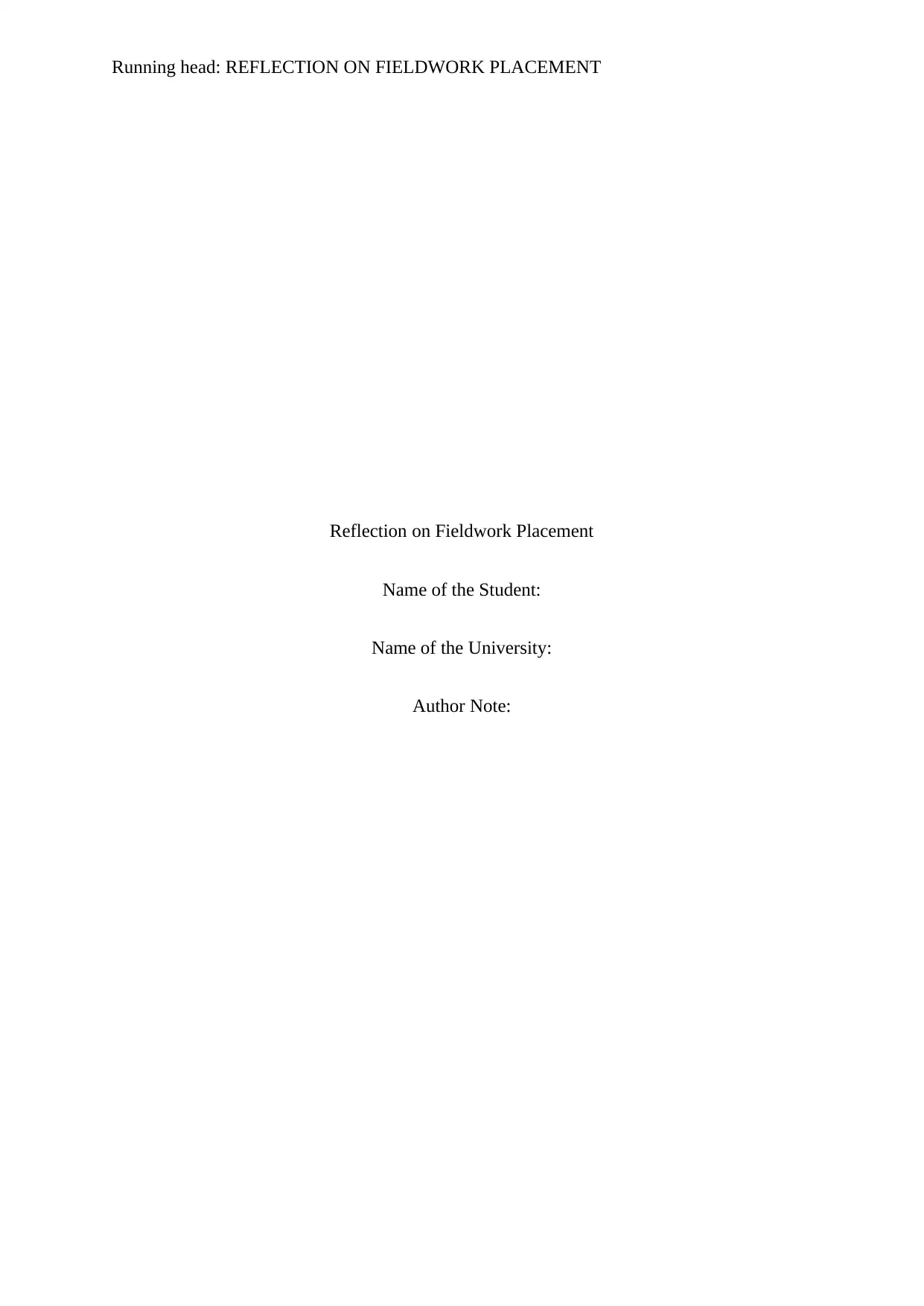
Running head: REFLECTION ON FIELDWORK PLACEMENT
Reflection on Fieldwork Placement
Name of the Student:
Name of the University:
Author Note:
Reflection on Fieldwork Placement
Name of the Student:
Name of the University:
Author Note:
Paraphrase This Document
Need a fresh take? Get an instant paraphrase of this document with our AI Paraphraser
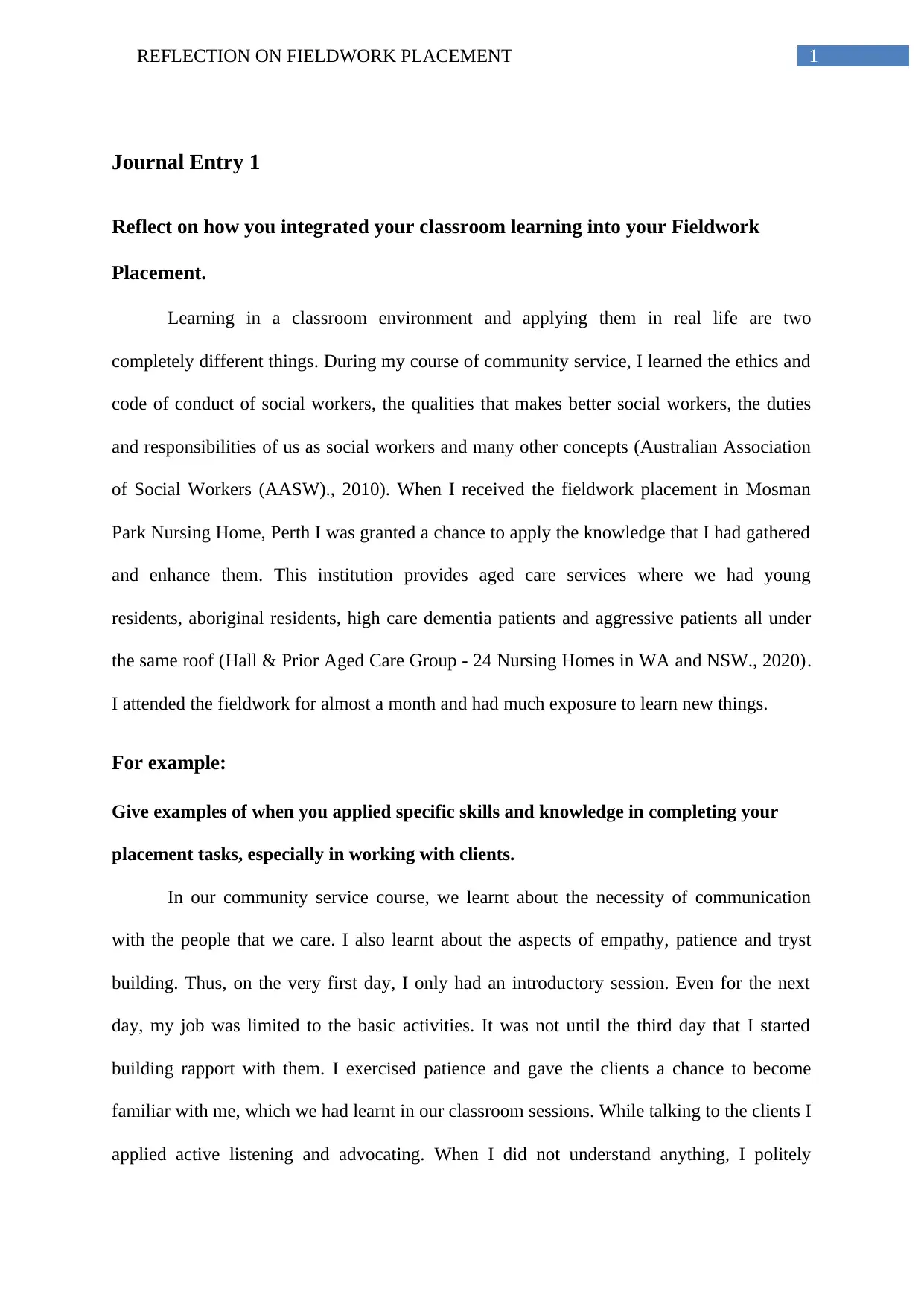
1REFLECTION ON FIELDWORK PLACEMENT
Journal Entry 1
Reflect on how you integrated your classroom learning into your Fieldwork
Placement.
Learning in a classroom environment and applying them in real life are two
completely different things. During my course of community service, I learned the ethics and
code of conduct of social workers, the qualities that makes better social workers, the duties
and responsibilities of us as social workers and many other concepts (Australian Association
of Social Workers (AASW)., 2010). When I received the fieldwork placement in Mosman
Park Nursing Home, Perth I was granted a chance to apply the knowledge that I had gathered
and enhance them. This institution provides aged care services where we had young
residents, aboriginal residents, high care dementia patients and aggressive patients all under
the same roof (Hall & Prior Aged Care Group - 24 Nursing Homes in WA and NSW., 2020).
I attended the fieldwork for almost a month and had much exposure to learn new things.
For example:
Give examples of when you applied specific skills and knowledge in completing your
placement tasks, especially in working with clients.
In our community service course, we learnt about the necessity of communication
with the people that we care. I also learnt about the aspects of empathy, patience and tryst
building. Thus, on the very first day, I only had an introductory session. Even for the next
day, my job was limited to the basic activities. It was not until the third day that I started
building rapport with them. I exercised patience and gave the clients a chance to become
familiar with me, which we had learnt in our classroom sessions. While talking to the clients I
applied active listening and advocating. When I did not understand anything, I politely
Journal Entry 1
Reflect on how you integrated your classroom learning into your Fieldwork
Placement.
Learning in a classroom environment and applying them in real life are two
completely different things. During my course of community service, I learned the ethics and
code of conduct of social workers, the qualities that makes better social workers, the duties
and responsibilities of us as social workers and many other concepts (Australian Association
of Social Workers (AASW)., 2010). When I received the fieldwork placement in Mosman
Park Nursing Home, Perth I was granted a chance to apply the knowledge that I had gathered
and enhance them. This institution provides aged care services where we had young
residents, aboriginal residents, high care dementia patients and aggressive patients all under
the same roof (Hall & Prior Aged Care Group - 24 Nursing Homes in WA and NSW., 2020).
I attended the fieldwork for almost a month and had much exposure to learn new things.
For example:
Give examples of when you applied specific skills and knowledge in completing your
placement tasks, especially in working with clients.
In our community service course, we learnt about the necessity of communication
with the people that we care. I also learnt about the aspects of empathy, patience and tryst
building. Thus, on the very first day, I only had an introductory session. Even for the next
day, my job was limited to the basic activities. It was not until the third day that I started
building rapport with them. I exercised patience and gave the clients a chance to become
familiar with me, which we had learnt in our classroom sessions. While talking to the clients I
applied active listening and advocating. When I did not understand anything, I politely
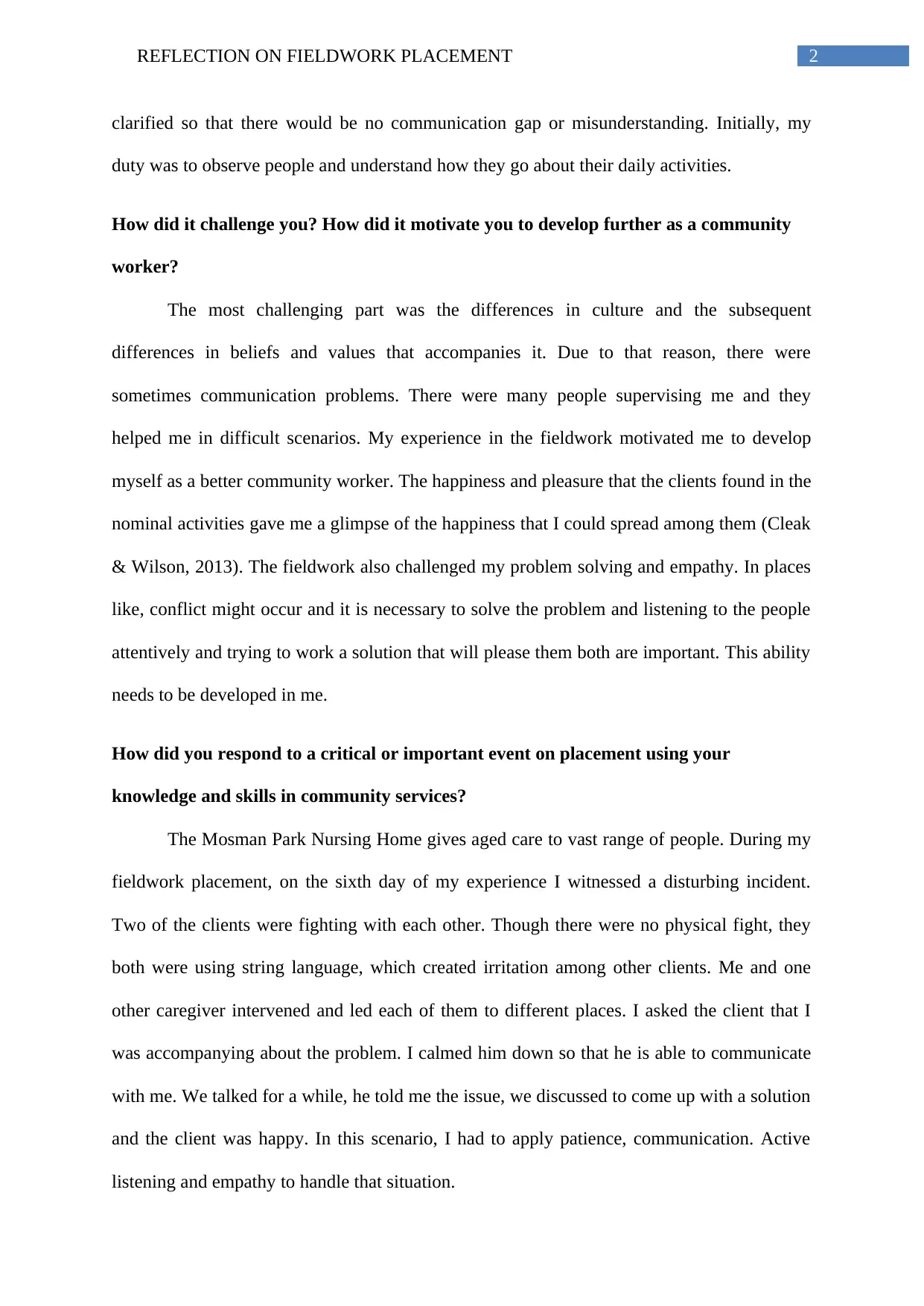
2REFLECTION ON FIELDWORK PLACEMENT
clarified so that there would be no communication gap or misunderstanding. Initially, my
duty was to observe people and understand how they go about their daily activities.
How did it challenge you? How did it motivate you to develop further as a community
worker?
The most challenging part was the differences in culture and the subsequent
differences in beliefs and values that accompanies it. Due to that reason, there were
sometimes communication problems. There were many people supervising me and they
helped me in difficult scenarios. My experience in the fieldwork motivated me to develop
myself as a better community worker. The happiness and pleasure that the clients found in the
nominal activities gave me a glimpse of the happiness that I could spread among them (Cleak
& Wilson, 2013). The fieldwork also challenged my problem solving and empathy. In places
like, conflict might occur and it is necessary to solve the problem and listening to the people
attentively and trying to work a solution that will please them both are important. This ability
needs to be developed in me.
How did you respond to a critical or important event on placement using your
knowledge and skills in community services?
The Mosman Park Nursing Home gives aged care to vast range of people. During my
fieldwork placement, on the sixth day of my experience I witnessed a disturbing incident.
Two of the clients were fighting with each other. Though there were no physical fight, they
both were using string language, which created irritation among other clients. Me and one
other caregiver intervened and led each of them to different places. I asked the client that I
was accompanying about the problem. I calmed him down so that he is able to communicate
with me. We talked for a while, he told me the issue, we discussed to come up with a solution
and the client was happy. In this scenario, I had to apply patience, communication. Active
listening and empathy to handle that situation.
clarified so that there would be no communication gap or misunderstanding. Initially, my
duty was to observe people and understand how they go about their daily activities.
How did it challenge you? How did it motivate you to develop further as a community
worker?
The most challenging part was the differences in culture and the subsequent
differences in beliefs and values that accompanies it. Due to that reason, there were
sometimes communication problems. There were many people supervising me and they
helped me in difficult scenarios. My experience in the fieldwork motivated me to develop
myself as a better community worker. The happiness and pleasure that the clients found in the
nominal activities gave me a glimpse of the happiness that I could spread among them (Cleak
& Wilson, 2013). The fieldwork also challenged my problem solving and empathy. In places
like, conflict might occur and it is necessary to solve the problem and listening to the people
attentively and trying to work a solution that will please them both are important. This ability
needs to be developed in me.
How did you respond to a critical or important event on placement using your
knowledge and skills in community services?
The Mosman Park Nursing Home gives aged care to vast range of people. During my
fieldwork placement, on the sixth day of my experience I witnessed a disturbing incident.
Two of the clients were fighting with each other. Though there were no physical fight, they
both were using string language, which created irritation among other clients. Me and one
other caregiver intervened and led each of them to different places. I asked the client that I
was accompanying about the problem. I calmed him down so that he is able to communicate
with me. We talked for a while, he told me the issue, we discussed to come up with a solution
and the client was happy. In this scenario, I had to apply patience, communication. Active
listening and empathy to handle that situation.
⊘ This is a preview!⊘
Do you want full access?
Subscribe today to unlock all pages.

Trusted by 1+ million students worldwide
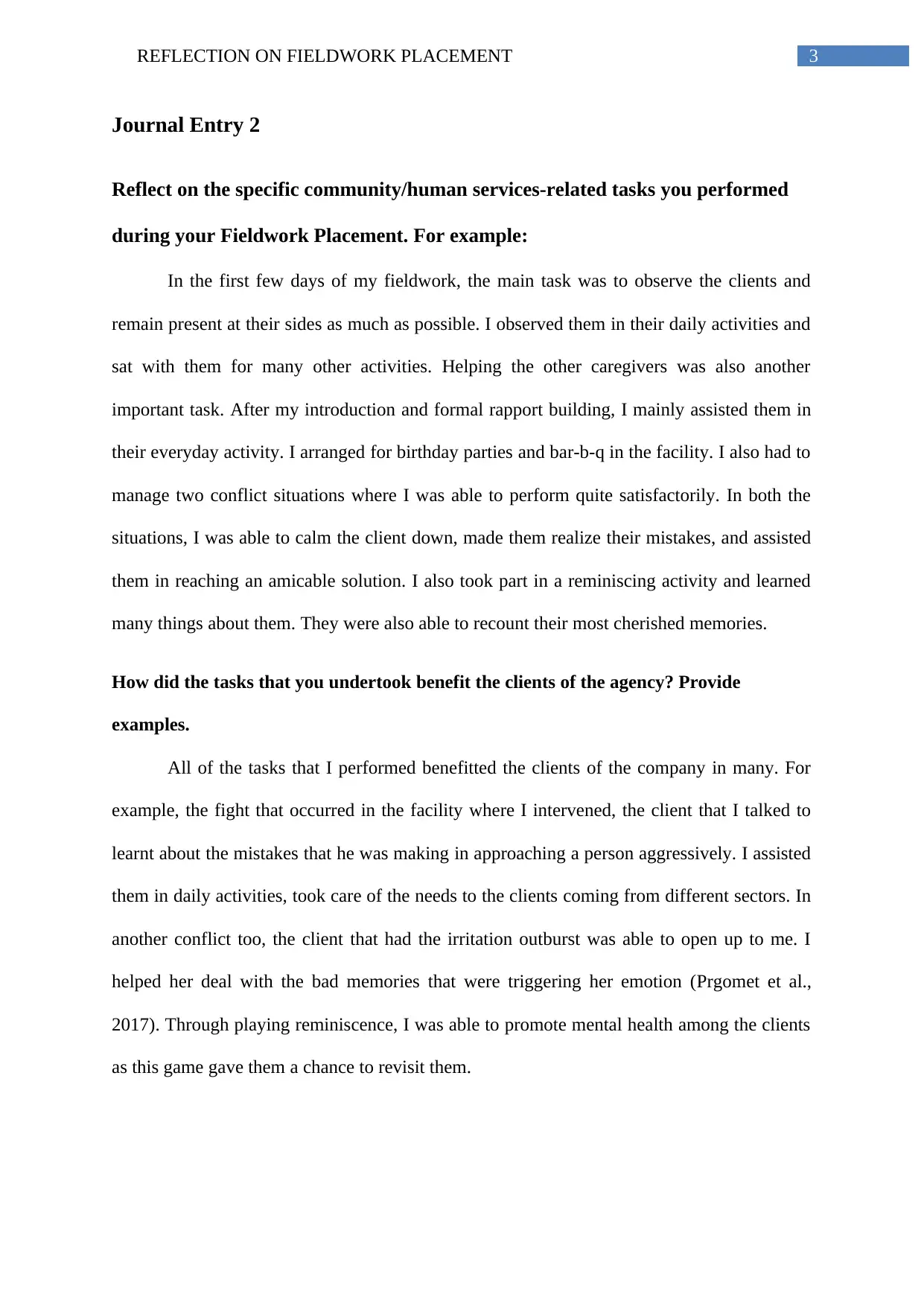
3REFLECTION ON FIELDWORK PLACEMENT
Journal Entry 2
Reflect on the specific community/human services-related tasks you performed
during your Fieldwork Placement. For example:
In the first few days of my fieldwork, the main task was to observe the clients and
remain present at their sides as much as possible. I observed them in their daily activities and
sat with them for many other activities. Helping the other caregivers was also another
important task. After my introduction and formal rapport building, I mainly assisted them in
their everyday activity. I arranged for birthday parties and bar-b-q in the facility. I also had to
manage two conflict situations where I was able to perform quite satisfactorily. In both the
situations, I was able to calm the client down, made them realize their mistakes, and assisted
them in reaching an amicable solution. I also took part in a reminiscing activity and learned
many things about them. They were also able to recount their most cherished memories.
How did the tasks that you undertook benefit the clients of the agency? Provide
examples.
All of the tasks that I performed benefitted the clients of the company in many. For
example, the fight that occurred in the facility where I intervened, the client that I talked to
learnt about the mistakes that he was making in approaching a person aggressively. I assisted
them in daily activities, took care of the needs to the clients coming from different sectors. In
another conflict too, the client that had the irritation outburst was able to open up to me. I
helped her deal with the bad memories that were triggering her emotion (Prgomet et al.,
2017). Through playing reminiscence, I was able to promote mental health among the clients
as this game gave them a chance to revisit them.
Journal Entry 2
Reflect on the specific community/human services-related tasks you performed
during your Fieldwork Placement. For example:
In the first few days of my fieldwork, the main task was to observe the clients and
remain present at their sides as much as possible. I observed them in their daily activities and
sat with them for many other activities. Helping the other caregivers was also another
important task. After my introduction and formal rapport building, I mainly assisted them in
their everyday activity. I arranged for birthday parties and bar-b-q in the facility. I also had to
manage two conflict situations where I was able to perform quite satisfactorily. In both the
situations, I was able to calm the client down, made them realize their mistakes, and assisted
them in reaching an amicable solution. I also took part in a reminiscing activity and learned
many things about them. They were also able to recount their most cherished memories.
How did the tasks that you undertook benefit the clients of the agency? Provide
examples.
All of the tasks that I performed benefitted the clients of the company in many. For
example, the fight that occurred in the facility where I intervened, the client that I talked to
learnt about the mistakes that he was making in approaching a person aggressively. I assisted
them in daily activities, took care of the needs to the clients coming from different sectors. In
another conflict too, the client that had the irritation outburst was able to open up to me. I
helped her deal with the bad memories that were triggering her emotion (Prgomet et al.,
2017). Through playing reminiscence, I was able to promote mental health among the clients
as this game gave them a chance to revisit them.
Paraphrase This Document
Need a fresh take? Get an instant paraphrase of this document with our AI Paraphraser
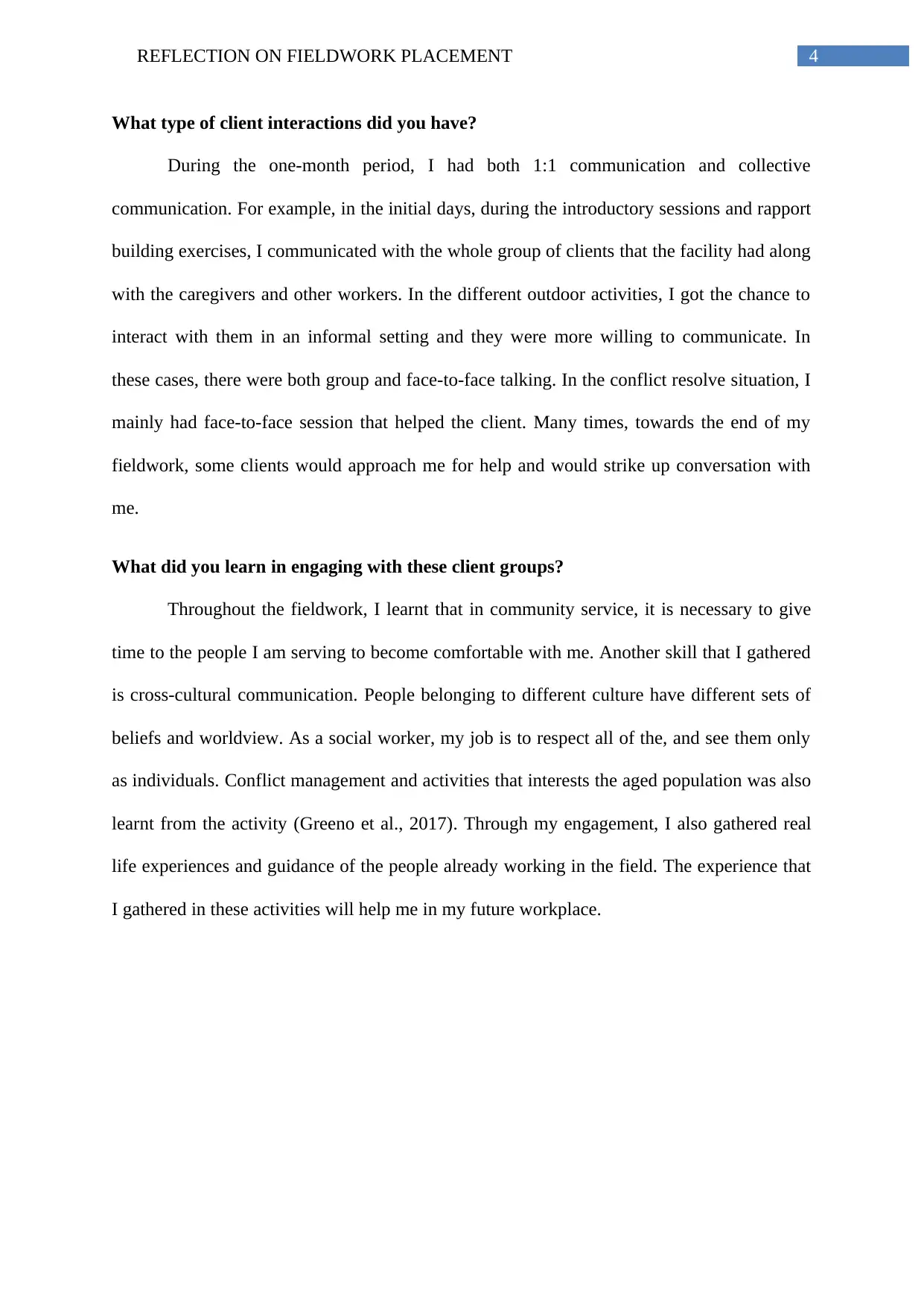
4REFLECTION ON FIELDWORK PLACEMENT
What type of client interactions did you have?
During the one-month period, I had both 1:1 communication and collective
communication. For example, in the initial days, during the introductory sessions and rapport
building exercises, I communicated with the whole group of clients that the facility had along
with the caregivers and other workers. In the different outdoor activities, I got the chance to
interact with them in an informal setting and they were more willing to communicate. In
these cases, there were both group and face-to-face talking. In the conflict resolve situation, I
mainly had face-to-face session that helped the client. Many times, towards the end of my
fieldwork, some clients would approach me for help and would strike up conversation with
me.
What did you learn in engaging with these client groups?
Throughout the fieldwork, I learnt that in community service, it is necessary to give
time to the people I am serving to become comfortable with me. Another skill that I gathered
is cross-cultural communication. People belonging to different culture have different sets of
beliefs and worldview. As a social worker, my job is to respect all of the, and see them only
as individuals. Conflict management and activities that interests the aged population was also
learnt from the activity (Greeno et al., 2017). Through my engagement, I also gathered real
life experiences and guidance of the people already working in the field. The experience that
I gathered in these activities will help me in my future workplace.
What type of client interactions did you have?
During the one-month period, I had both 1:1 communication and collective
communication. For example, in the initial days, during the introductory sessions and rapport
building exercises, I communicated with the whole group of clients that the facility had along
with the caregivers and other workers. In the different outdoor activities, I got the chance to
interact with them in an informal setting and they were more willing to communicate. In
these cases, there were both group and face-to-face talking. In the conflict resolve situation, I
mainly had face-to-face session that helped the client. Many times, towards the end of my
fieldwork, some clients would approach me for help and would strike up conversation with
me.
What did you learn in engaging with these client groups?
Throughout the fieldwork, I learnt that in community service, it is necessary to give
time to the people I am serving to become comfortable with me. Another skill that I gathered
is cross-cultural communication. People belonging to different culture have different sets of
beliefs and worldview. As a social worker, my job is to respect all of the, and see them only
as individuals. Conflict management and activities that interests the aged population was also
learnt from the activity (Greeno et al., 2017). Through my engagement, I also gathered real
life experiences and guidance of the people already working in the field. The experience that
I gathered in these activities will help me in my future workplace.
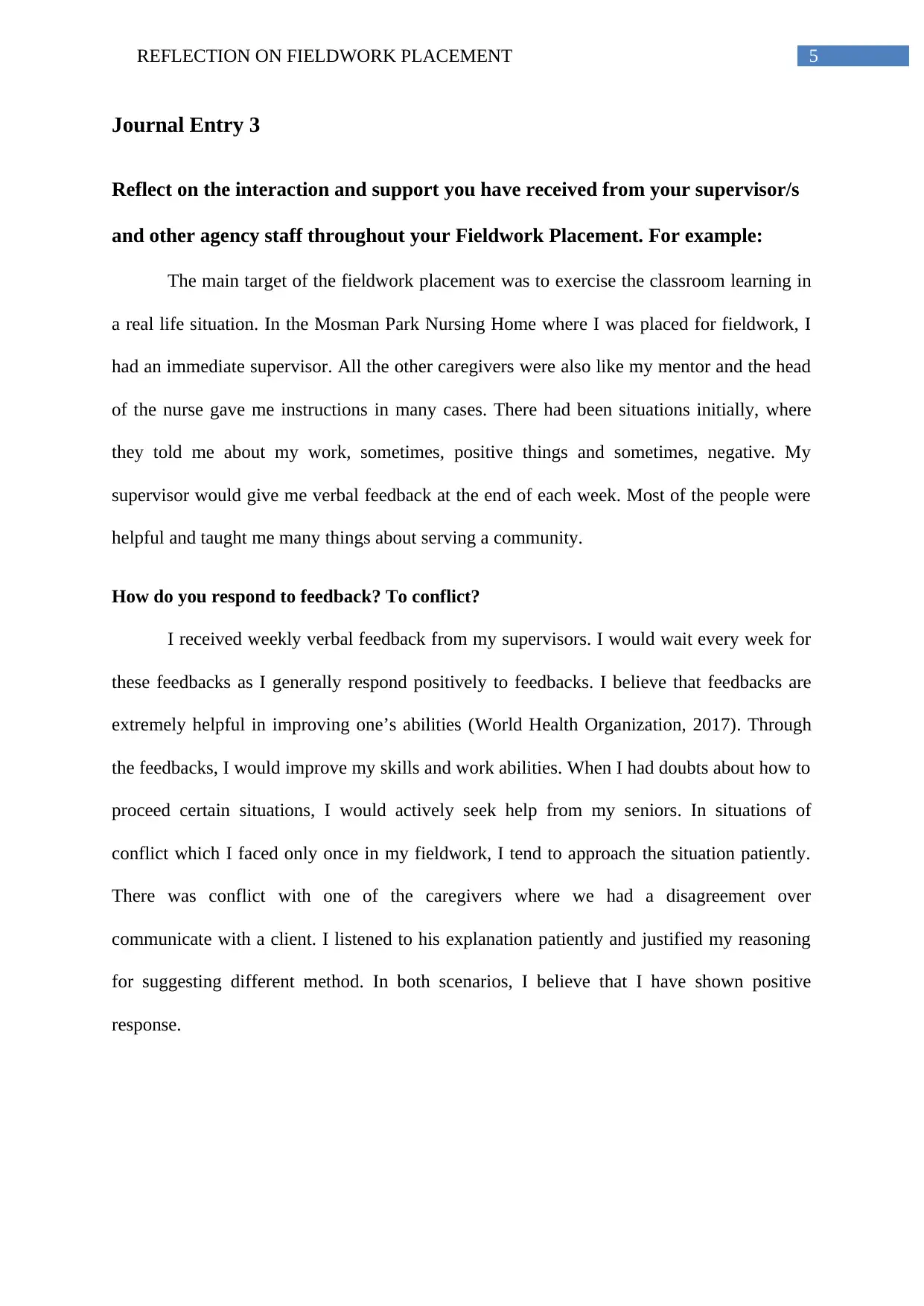
5REFLECTION ON FIELDWORK PLACEMENT
Journal Entry 3
Reflect on the interaction and support you have received from your supervisor/s
and other agency staff throughout your Fieldwork Placement. For example:
The main target of the fieldwork placement was to exercise the classroom learning in
a real life situation. In the Mosman Park Nursing Home where I was placed for fieldwork, I
had an immediate supervisor. All the other caregivers were also like my mentor and the head
of the nurse gave me instructions in many cases. There had been situations initially, where
they told me about my work, sometimes, positive things and sometimes, negative. My
supervisor would give me verbal feedback at the end of each week. Most of the people were
helpful and taught me many things about serving a community.
How do you respond to feedback? To conflict?
I received weekly verbal feedback from my supervisors. I would wait every week for
these feedbacks as I generally respond positively to feedbacks. I believe that feedbacks are
extremely helpful in improving one’s abilities (World Health Organization, 2017). Through
the feedbacks, I would improve my skills and work abilities. When I had doubts about how to
proceed certain situations, I would actively seek help from my seniors. In situations of
conflict which I faced only once in my fieldwork, I tend to approach the situation patiently.
There was conflict with one of the caregivers where we had a disagreement over
communicate with a client. I listened to his explanation patiently and justified my reasoning
for suggesting different method. In both scenarios, I believe that I have shown positive
response.
Journal Entry 3
Reflect on the interaction and support you have received from your supervisor/s
and other agency staff throughout your Fieldwork Placement. For example:
The main target of the fieldwork placement was to exercise the classroom learning in
a real life situation. In the Mosman Park Nursing Home where I was placed for fieldwork, I
had an immediate supervisor. All the other caregivers were also like my mentor and the head
of the nurse gave me instructions in many cases. There had been situations initially, where
they told me about my work, sometimes, positive things and sometimes, negative. My
supervisor would give me verbal feedback at the end of each week. Most of the people were
helpful and taught me many things about serving a community.
How do you respond to feedback? To conflict?
I received weekly verbal feedback from my supervisors. I would wait every week for
these feedbacks as I generally respond positively to feedbacks. I believe that feedbacks are
extremely helpful in improving one’s abilities (World Health Organization, 2017). Through
the feedbacks, I would improve my skills and work abilities. When I had doubts about how to
proceed certain situations, I would actively seek help from my seniors. In situations of
conflict which I faced only once in my fieldwork, I tend to approach the situation patiently.
There was conflict with one of the caregivers where we had a disagreement over
communicate with a client. I listened to his explanation patiently and justified my reasoning
for suggesting different method. In both scenarios, I believe that I have shown positive
response.
⊘ This is a preview!⊘
Do you want full access?
Subscribe today to unlock all pages.

Trusted by 1+ million students worldwide
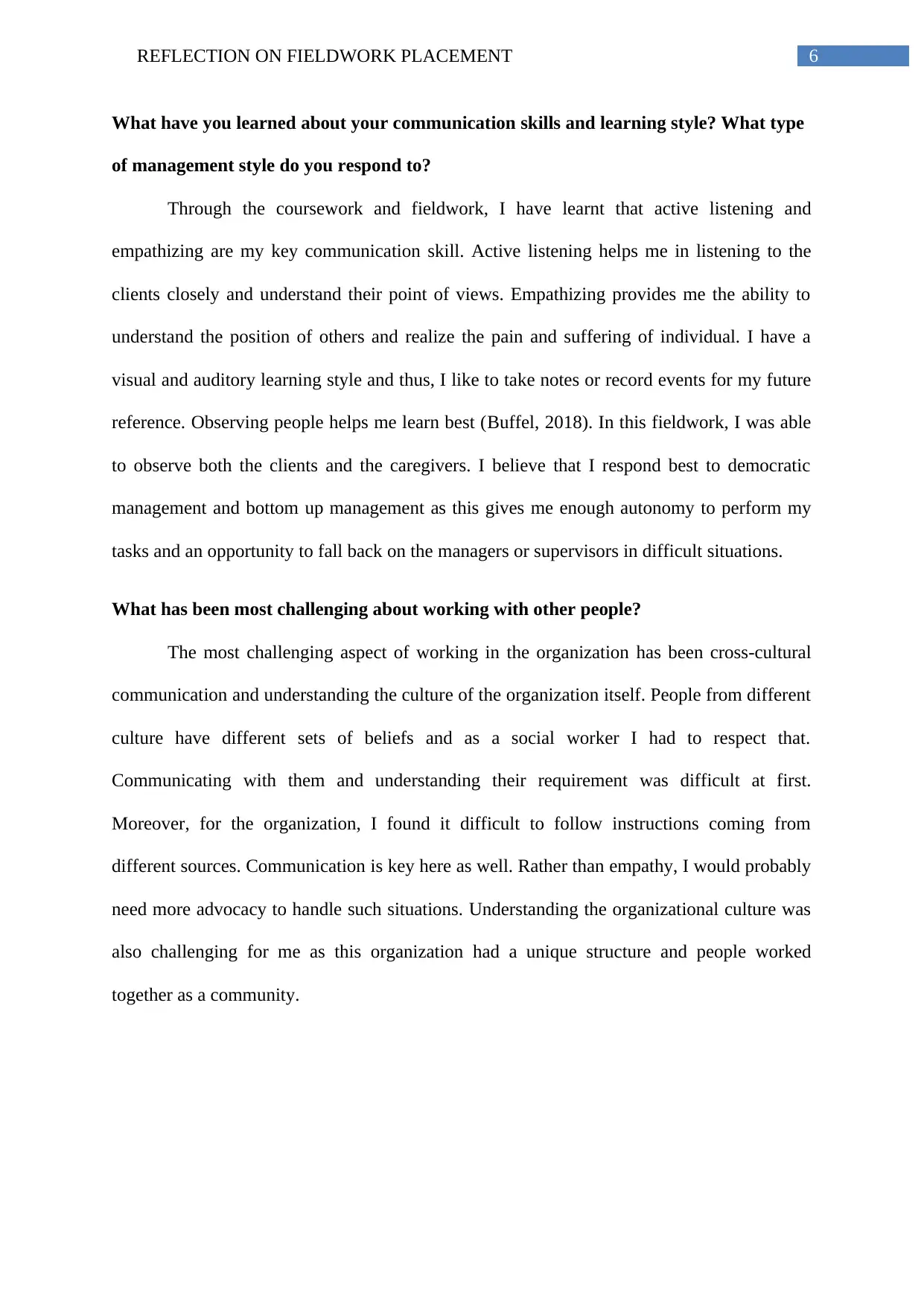
6REFLECTION ON FIELDWORK PLACEMENT
What have you learned about your communication skills and learning style? What type
of management style do you respond to?
Through the coursework and fieldwork, I have learnt that active listening and
empathizing are my key communication skill. Active listening helps me in listening to the
clients closely and understand their point of views. Empathizing provides me the ability to
understand the position of others and realize the pain and suffering of individual. I have a
visual and auditory learning style and thus, I like to take notes or record events for my future
reference. Observing people helps me learn best (Buffel, 2018). In this fieldwork, I was able
to observe both the clients and the caregivers. I believe that I respond best to democratic
management and bottom up management as this gives me enough autonomy to perform my
tasks and an opportunity to fall back on the managers or supervisors in difficult situations.
What has been most challenging about working with other people?
The most challenging aspect of working in the organization has been cross-cultural
communication and understanding the culture of the organization itself. People from different
culture have different sets of beliefs and as a social worker I had to respect that.
Communicating with them and understanding their requirement was difficult at first.
Moreover, for the organization, I found it difficult to follow instructions coming from
different sources. Communication is key here as well. Rather than empathy, I would probably
need more advocacy to handle such situations. Understanding the organizational culture was
also challenging for me as this organization had a unique structure and people worked
together as a community.
What have you learned about your communication skills and learning style? What type
of management style do you respond to?
Through the coursework and fieldwork, I have learnt that active listening and
empathizing are my key communication skill. Active listening helps me in listening to the
clients closely and understand their point of views. Empathizing provides me the ability to
understand the position of others and realize the pain and suffering of individual. I have a
visual and auditory learning style and thus, I like to take notes or record events for my future
reference. Observing people helps me learn best (Buffel, 2018). In this fieldwork, I was able
to observe both the clients and the caregivers. I believe that I respond best to democratic
management and bottom up management as this gives me enough autonomy to perform my
tasks and an opportunity to fall back on the managers or supervisors in difficult situations.
What has been most challenging about working with other people?
The most challenging aspect of working in the organization has been cross-cultural
communication and understanding the culture of the organization itself. People from different
culture have different sets of beliefs and as a social worker I had to respect that.
Communicating with them and understanding their requirement was difficult at first.
Moreover, for the organization, I found it difficult to follow instructions coming from
different sources. Communication is key here as well. Rather than empathy, I would probably
need more advocacy to handle such situations. Understanding the organizational culture was
also challenging for me as this organization had a unique structure and people worked
together as a community.
Paraphrase This Document
Need a fresh take? Get an instant paraphrase of this document with our AI Paraphraser
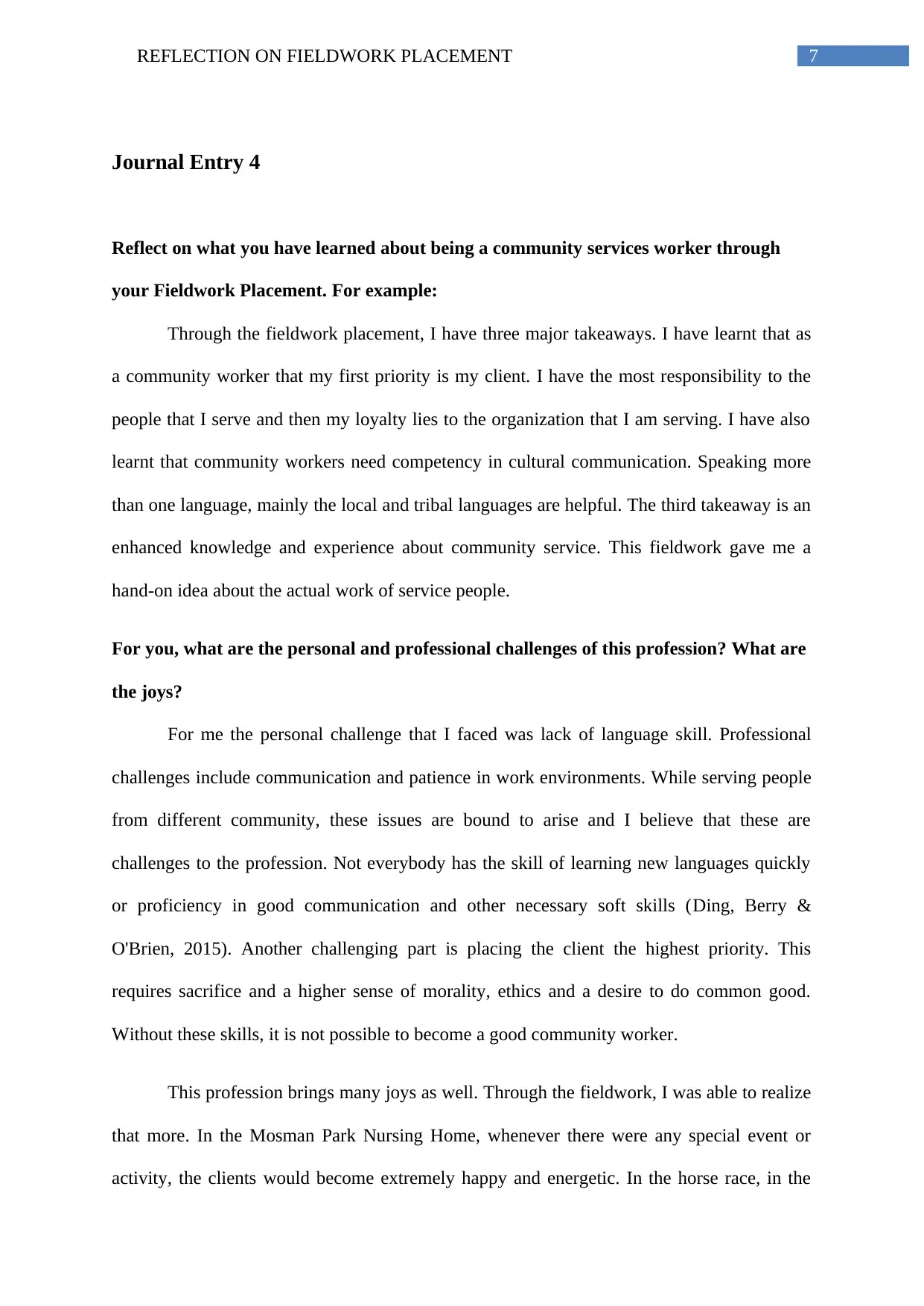
7REFLECTION ON FIELDWORK PLACEMENT
Journal Entry 4
Reflect on what you have learned about being a community services worker through
your Fieldwork Placement. For example:
Through the fieldwork placement, I have three major takeaways. I have learnt that as
a community worker that my first priority is my client. I have the most responsibility to the
people that I serve and then my loyalty lies to the organization that I am serving. I have also
learnt that community workers need competency in cultural communication. Speaking more
than one language, mainly the local and tribal languages are helpful. The third takeaway is an
enhanced knowledge and experience about community service. This fieldwork gave me a
hand-on idea about the actual work of service people.
For you, what are the personal and professional challenges of this profession? What are
the joys?
For me the personal challenge that I faced was lack of language skill. Professional
challenges include communication and patience in work environments. While serving people
from different community, these issues are bound to arise and I believe that these are
challenges to the profession. Not everybody has the skill of learning new languages quickly
or proficiency in good communication and other necessary soft skills (Ding, Berry &
O'Brien, 2015). Another challenging part is placing the client the highest priority. This
requires sacrifice and a higher sense of morality, ethics and a desire to do common good.
Without these skills, it is not possible to become a good community worker.
This profession brings many joys as well. Through the fieldwork, I was able to realize
that more. In the Mosman Park Nursing Home, whenever there were any special event or
activity, the clients would become extremely happy and energetic. In the horse race, in the
Journal Entry 4
Reflect on what you have learned about being a community services worker through
your Fieldwork Placement. For example:
Through the fieldwork placement, I have three major takeaways. I have learnt that as
a community worker that my first priority is my client. I have the most responsibility to the
people that I serve and then my loyalty lies to the organization that I am serving. I have also
learnt that community workers need competency in cultural communication. Speaking more
than one language, mainly the local and tribal languages are helpful. The third takeaway is an
enhanced knowledge and experience about community service. This fieldwork gave me a
hand-on idea about the actual work of service people.
For you, what are the personal and professional challenges of this profession? What are
the joys?
For me the personal challenge that I faced was lack of language skill. Professional
challenges include communication and patience in work environments. While serving people
from different community, these issues are bound to arise and I believe that these are
challenges to the profession. Not everybody has the skill of learning new languages quickly
or proficiency in good communication and other necessary soft skills (Ding, Berry &
O'Brien, 2015). Another challenging part is placing the client the highest priority. This
requires sacrifice and a higher sense of morality, ethics and a desire to do common good.
Without these skills, it is not possible to become a good community worker.
This profession brings many joys as well. Through the fieldwork, I was able to realize
that more. In the Mosman Park Nursing Home, whenever there were any special event or
activity, the clients would become extremely happy and energetic. In the horse race, in the
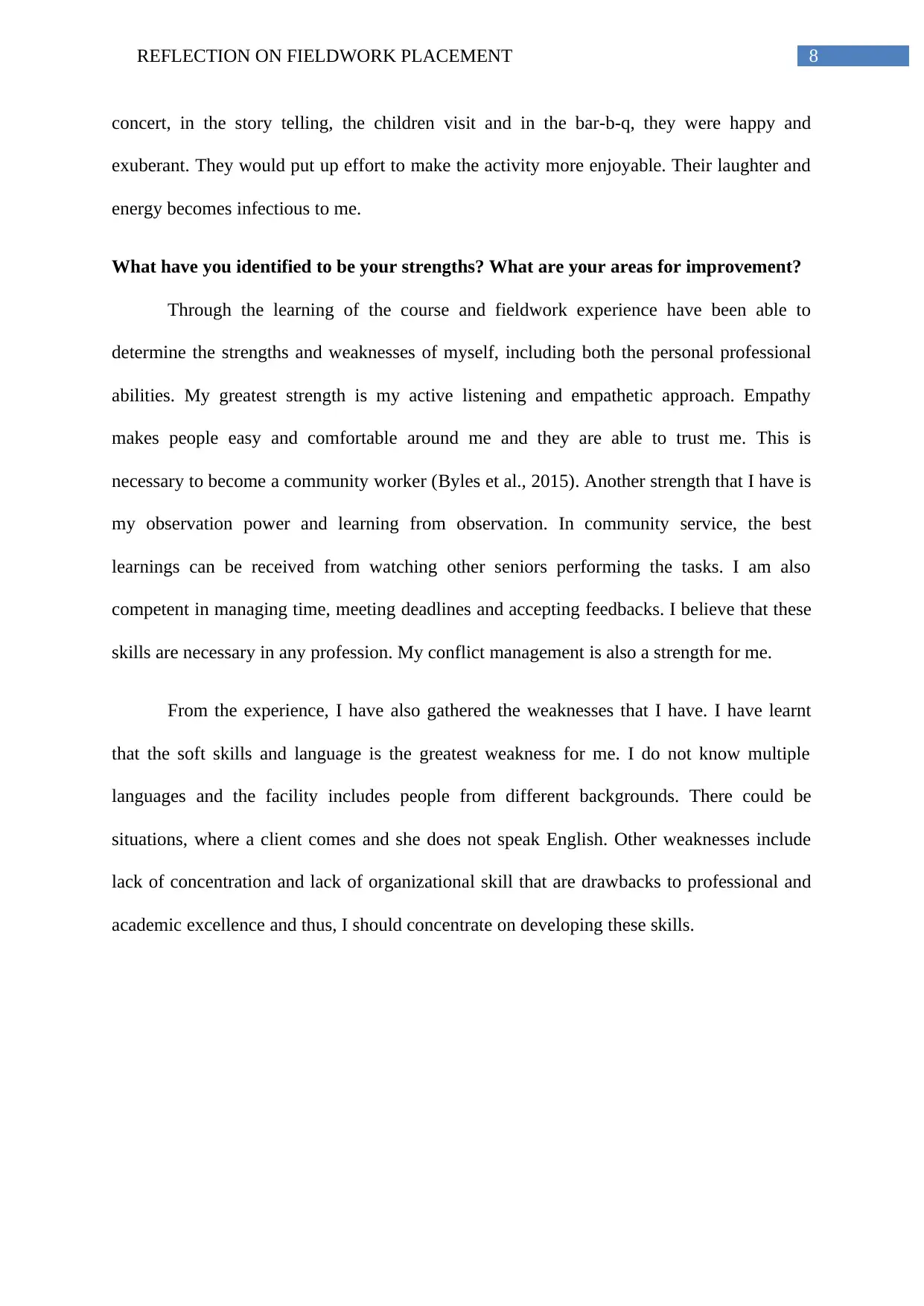
8REFLECTION ON FIELDWORK PLACEMENT
concert, in the story telling, the children visit and in the bar-b-q, they were happy and
exuberant. They would put up effort to make the activity more enjoyable. Their laughter and
energy becomes infectious to me.
What have you identified to be your strengths? What are your areas for improvement?
Through the learning of the course and fieldwork experience have been able to
determine the strengths and weaknesses of myself, including both the personal professional
abilities. My greatest strength is my active listening and empathetic approach. Empathy
makes people easy and comfortable around me and they are able to trust me. This is
necessary to become a community worker (Byles et al., 2015). Another strength that I have is
my observation power and learning from observation. In community service, the best
learnings can be received from watching other seniors performing the tasks. I am also
competent in managing time, meeting deadlines and accepting feedbacks. I believe that these
skills are necessary in any profession. My conflict management is also a strength for me.
From the experience, I have also gathered the weaknesses that I have. I have learnt
that the soft skills and language is the greatest weakness for me. I do not know multiple
languages and the facility includes people from different backgrounds. There could be
situations, where a client comes and she does not speak English. Other weaknesses include
lack of concentration and lack of organizational skill that are drawbacks to professional and
academic excellence and thus, I should concentrate on developing these skills.
concert, in the story telling, the children visit and in the bar-b-q, they were happy and
exuberant. They would put up effort to make the activity more enjoyable. Their laughter and
energy becomes infectious to me.
What have you identified to be your strengths? What are your areas for improvement?
Through the learning of the course and fieldwork experience have been able to
determine the strengths and weaknesses of myself, including both the personal professional
abilities. My greatest strength is my active listening and empathetic approach. Empathy
makes people easy and comfortable around me and they are able to trust me. This is
necessary to become a community worker (Byles et al., 2015). Another strength that I have is
my observation power and learning from observation. In community service, the best
learnings can be received from watching other seniors performing the tasks. I am also
competent in managing time, meeting deadlines and accepting feedbacks. I believe that these
skills are necessary in any profession. My conflict management is also a strength for me.
From the experience, I have also gathered the weaknesses that I have. I have learnt
that the soft skills and language is the greatest weakness for me. I do not know multiple
languages and the facility includes people from different backgrounds. There could be
situations, where a client comes and she does not speak English. Other weaknesses include
lack of concentration and lack of organizational skill that are drawbacks to professional and
academic excellence and thus, I should concentrate on developing these skills.
⊘ This is a preview!⊘
Do you want full access?
Subscribe today to unlock all pages.

Trusted by 1+ million students worldwide
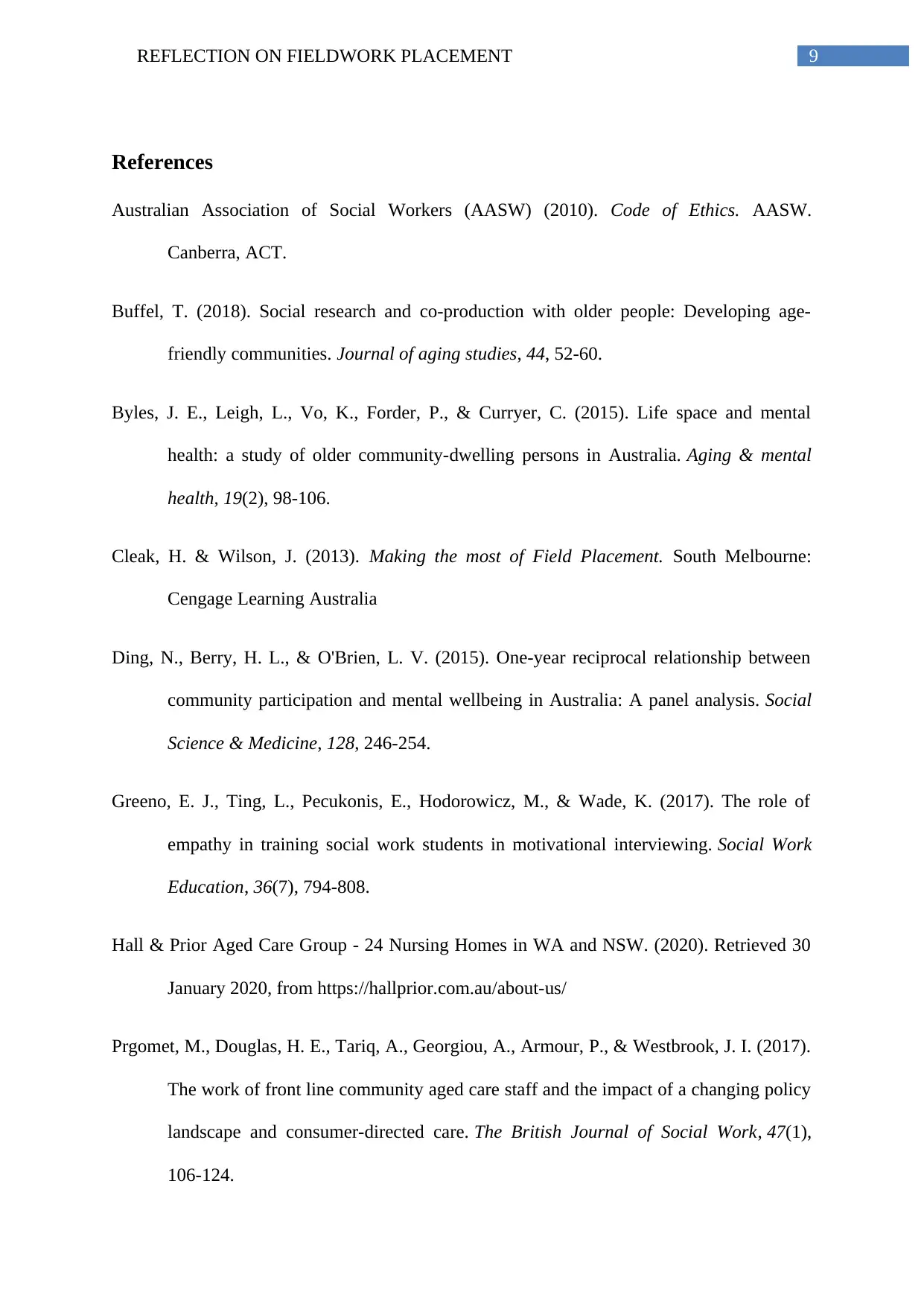
9REFLECTION ON FIELDWORK PLACEMENT
References
Australian Association of Social Workers (AASW) (2010). Code of Ethics. AASW.
Canberra, ACT.
Buffel, T. (2018). Social research and co-production with older people: Developing age-
friendly communities. Journal of aging studies, 44, 52-60.
Byles, J. E., Leigh, L., Vo, K., Forder, P., & Curryer, C. (2015). Life space and mental
health: a study of older community-dwelling persons in Australia. Aging & mental
health, 19(2), 98-106.
Cleak, H. & Wilson, J. (2013). Making the most of Field Placement. South Melbourne:
Cengage Learning Australia
Ding, N., Berry, H. L., & O'Brien, L. V. (2015). One-year reciprocal relationship between
community participation and mental wellbeing in Australia: A panel analysis. Social
Science & Medicine, 128, 246-254.
Greeno, E. J., Ting, L., Pecukonis, E., Hodorowicz, M., & Wade, K. (2017). The role of
empathy in training social work students in motivational interviewing. Social Work
Education, 36(7), 794-808.
Hall & Prior Aged Care Group - 24 Nursing Homes in WA and NSW. (2020). Retrieved 30
January 2020, from https://hallprior.com.au/about-us/
Prgomet, M., Douglas, H. E., Tariq, A., Georgiou, A., Armour, P., & Westbrook, J. I. (2017).
The work of front line community aged care staff and the impact of a changing policy
landscape and consumer-directed care. The British Journal of Social Work, 47(1),
106-124.
References
Australian Association of Social Workers (AASW) (2010). Code of Ethics. AASW.
Canberra, ACT.
Buffel, T. (2018). Social research and co-production with older people: Developing age-
friendly communities. Journal of aging studies, 44, 52-60.
Byles, J. E., Leigh, L., Vo, K., Forder, P., & Curryer, C. (2015). Life space and mental
health: a study of older community-dwelling persons in Australia. Aging & mental
health, 19(2), 98-106.
Cleak, H. & Wilson, J. (2013). Making the most of Field Placement. South Melbourne:
Cengage Learning Australia
Ding, N., Berry, H. L., & O'Brien, L. V. (2015). One-year reciprocal relationship between
community participation and mental wellbeing in Australia: A panel analysis. Social
Science & Medicine, 128, 246-254.
Greeno, E. J., Ting, L., Pecukonis, E., Hodorowicz, M., & Wade, K. (2017). The role of
empathy in training social work students in motivational interviewing. Social Work
Education, 36(7), 794-808.
Hall & Prior Aged Care Group - 24 Nursing Homes in WA and NSW. (2020). Retrieved 30
January 2020, from https://hallprior.com.au/about-us/
Prgomet, M., Douglas, H. E., Tariq, A., Georgiou, A., Armour, P., & Westbrook, J. I. (2017).
The work of front line community aged care staff and the impact of a changing policy
landscape and consumer-directed care. The British Journal of Social Work, 47(1),
106-124.
Paraphrase This Document
Need a fresh take? Get an instant paraphrase of this document with our AI Paraphraser
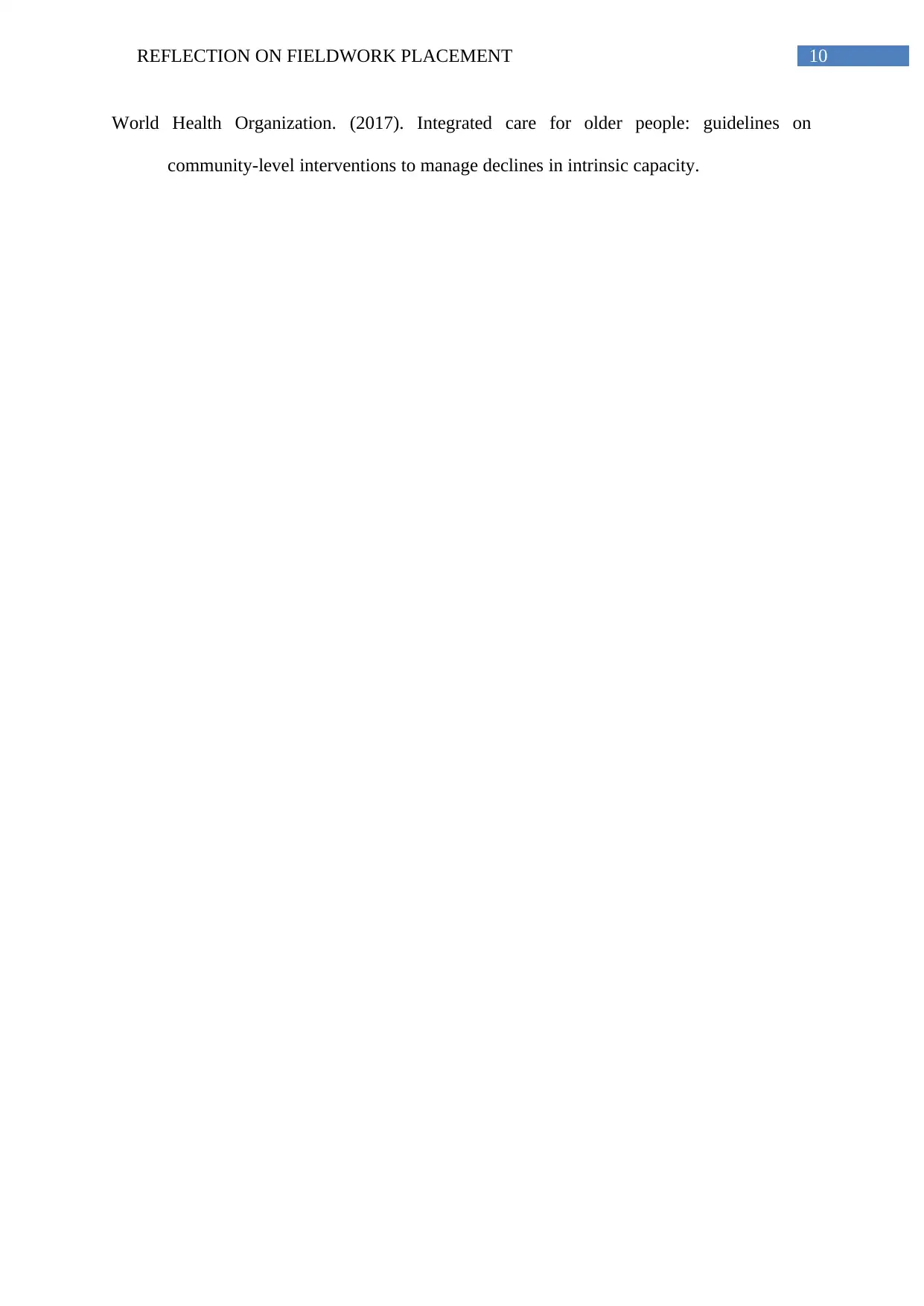
10REFLECTION ON FIELDWORK PLACEMENT
World Health Organization. (2017). Integrated care for older people: guidelines on
community-level interventions to manage declines in intrinsic capacity.
World Health Organization. (2017). Integrated care for older people: guidelines on
community-level interventions to manage declines in intrinsic capacity.
1 out of 11
Related Documents
Your All-in-One AI-Powered Toolkit for Academic Success.
+13062052269
info@desklib.com
Available 24*7 on WhatsApp / Email
![[object Object]](/_next/static/media/star-bottom.7253800d.svg)
Unlock your academic potential
Copyright © 2020–2026 A2Z Services. All Rights Reserved. Developed and managed by ZUCOL.




